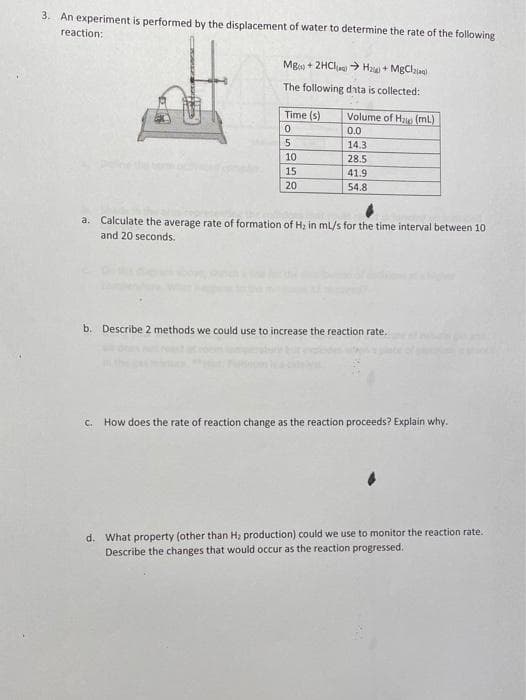3. An experiment is performed by the displacement of water to determine the rate of the following reaction: Mg + 2HC He+ MgCle The following dhta is collected: Time (s) Volume of He (ml) 0.0 14.3 10 28.5 15 41.9 20 54.8 a. Calculate the average rate of formation of Hạ in ml/s for the time interval between 10 and 20 seconds. b. Describe 2 methods we could use to increase the reaction rate. C. How does the rate of reaction change as the reaction proceeds? Explain why. d. What property (other than H; production) could we use to monitor the reaction rate. Describe the changes that would occur as the reaction progressed.
3. An experiment is performed by the displacement of water to determine the rate of the following reaction: Mg + 2HC He+ MgCle The following dhta is collected: Time (s) Volume of He (ml) 0.0 14.3 10 28.5 15 41.9 20 54.8 a. Calculate the average rate of formation of Hạ in ml/s for the time interval between 10 and 20 seconds. b. Describe 2 methods we could use to increase the reaction rate. C. How does the rate of reaction change as the reaction proceeds? Explain why. d. What property (other than H; production) could we use to monitor the reaction rate. Describe the changes that would occur as the reaction progressed.
Chapter30: Kinetic Methods Of Analysis
Section: Chapter Questions
Problem 30.16QAP
Related questions
Question

Transcribed Image Text:3. An experiment is performed by the displacement of water to determine the rate of the following
reaction:
Mgu + 2HCI H + MgCla
The following dhta is collected:
Time (s)
Volume of Hae (mL)
0.0
5.
14.3
10
28.5
15
41.9
20
54.8
a. Calculate the average rate of formation of H; in ml/s for the time interval between 10
and 20 seconds.
b. Describe 2 methods we could use to increase the reaction rate.
c. How does the rate of reaction change as the reaction proceeds? Explain why.
d. What property (other than H; production) could we use to monitor the reaction rate.
Describe the changes that would occur as the reaction progressed.
Expert Solution
This question has been solved!
Explore an expertly crafted, step-by-step solution for a thorough understanding of key concepts.
This is a popular solution!
Trending now
This is a popular solution!
Step by step
Solved in 2 steps with 1 images

Knowledge Booster
Learn more about
Need a deep-dive on the concept behind this application? Look no further. Learn more about this topic, chemistry and related others by exploring similar questions and additional content below.Recommended textbooks for you


Chemistry: The Molecular Science
Chemistry
ISBN:
9781285199047
Author:
John W. Moore, Conrad L. Stanitski
Publisher:
Cengage Learning

Chemistry & Chemical Reactivity
Chemistry
ISBN:
9781337399074
Author:
John C. Kotz, Paul M. Treichel, John Townsend, David Treichel
Publisher:
Cengage Learning


Chemistry: The Molecular Science
Chemistry
ISBN:
9781285199047
Author:
John W. Moore, Conrad L. Stanitski
Publisher:
Cengage Learning

Chemistry & Chemical Reactivity
Chemistry
ISBN:
9781337399074
Author:
John C. Kotz, Paul M. Treichel, John Townsend, David Treichel
Publisher:
Cengage Learning

Chemistry for Engineering Students
Chemistry
ISBN:
9781337398909
Author:
Lawrence S. Brown, Tom Holme
Publisher:
Cengage Learning

Chemistry: Principles and Reactions
Chemistry
ISBN:
9781305079373
Author:
William L. Masterton, Cecile N. Hurley
Publisher:
Cengage Learning

Chemistry & Chemical Reactivity
Chemistry
ISBN:
9781133949640
Author:
John C. Kotz, Paul M. Treichel, John Townsend, David Treichel
Publisher:
Cengage Learning